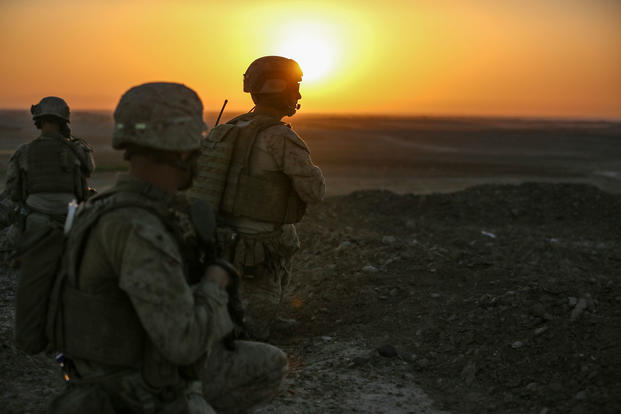 Defense Secretary Jim Mattis has spent more than 40 years in the study and practice of war, but his extensive thoughts and writings on the subject have often been selectively reduced to chesty one-liners. There's the admonition to the troops: "Be polite, be professional, but have a plan to kill everybody you meet." And another: "There's some a------s in the world that just need to be shot." Other examples of bumper sticker bravado could be cited that tend to drown out the context and Mattis' consistent underlying message in a career as Marine legend and four-star general -- that being prepared for war is the best way to prevent it.
Defense Secretary Jim Mattis has spent more than 40 years in the study and practice of war, but his extensive thoughts and writings on the subject have often been selectively reduced to chesty one-liners. There's the admonition to the troops: "Be polite, be professional, but have a plan to kill everybody you meet." And another: "There's some a------s in the world that just need to be shot." Other examples of bumper sticker bravado could be cited that tend to drown out the context and Mattis' consistent underlying message in a career as Marine legend and four-star general -- that being prepared for war is the best way to prevent it.
Mattis in the past week has been attempting to provide more context in three informal sessions with Pentagon reporters that he acknowledges undertaking at the suggestion of The Associated Press' senior defense correspondent, Bob Burns.
It's just him in the middle of a reporters' huddle. His aides stand aside but within earshot. He is unfailingly polite and direct in his responses to any topic that comes up, with the exception of those that he feels would give a clue to future operations.
Only once has he snapped at a question. Mattis took a question on civilian casualties in Yemen as suggesting that the U.S. didn't care about the casualties. "Don't screw with me," he said.
At the session with reporters last Friday, Mattis took questions on Pakistan, Syria, Korea, Iran, Russia, transgender recruits and the budget and, in the process, made a statement that could be added to his lexicon of one-liners.
"What counts most in war is [the] most difficult to count," he said in expanding on his thoughts about civil war in Syria in response to a question about whether progress could be gauged by the number of Islamic State of Iraq and Syria (ISIS) fighters killed.
Another reporter interjected that Mattis had recently said in Tel Aviv, "I've got better things to do than counting while the fight's still going on."
Mattis went on to say: "Yes, we're not going to get into that sort of thing. You'll know probably the most challenging part in assessing in combat -- to include specifically your question -- is that what counts most in war is most difficult to count, to quantify, OK?"
The most difficult thing to quantify is the enemy's morale, Mattis said, but there are "lagging indicators" that would show that constant pressure is having an effect.
"Morale, eventually, you'll see a lagging indicator," he said. "You'll see that not as many people want to be recruited into a force that's getting annihilated -- witness Syria.
"You won't see as many foreigners coming to join witness this. So you can kind of look at what's happened in Syria and say, 'Wait a minute. They're not putting out squads to go blow off bombs in Brussels anymore.' They can't. You know, this sort of thing," Mattis said.
The problem is that "not always can you quantify where you're at, at any one moment," he said, but in the case of ISIS "we'll fight them" until the threat is eliminated.
Mattis also spoke on tyranny and revolution in commenting on the recent street protests in Iran against the Islamic regime.
"You know, it's interesting. You know, I enjoy reading history, just because I learn a lot from it. And, if you watch, when people confront tyranny -- and this goes back 1,000-2,000 years -- people, eventually, they get fed up with it," he said.
"And whether it be physical tyranny or mental tyranny or spiritual tyranny, they revolt against it," Mattis said.
"So we may come from different directions," he said of Iranian and American judgments on the regime in Tehran, "but ultimately, it's the same kind of tyranny.
"In their case, it's about their internal government, what it does to them. In our case, it's that, plus it's what that government has done to espouse or support terrorism, destabilizing activities, export of ballistic missiles, disruption of commerce. All these kinds of things," he said.
Mattis declined to speculate on what may come next, and what the U.S. response would be.
"There's a reason I have four-stars out in the field," he said of the combatant commanders.
-- Richard Sisk can be reached at Richard.Sisk@Military.com.
No comments:
Post a Comment